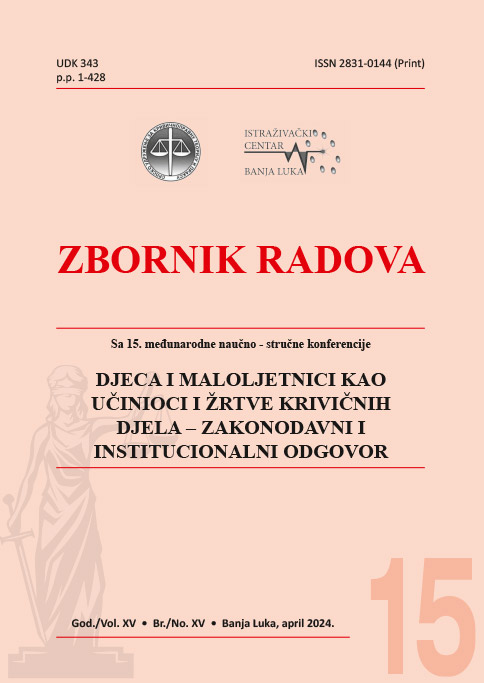CRIMINAL-POLITICAL ACCEPTABILITY OF LOWERING MINIMUM AGE OF CRIMINAL RESPONSIBILITY
DOI:
https://doi.org/10.7251/CEST1524122DJKeywords:
infant, minor, age limit, criminal responsibilityAbstract
Although in principle it can be said that the criminal acts of persons who have not reached the required age for responsibility in criminal law do not pose a serious threat to public order, from time to time society encounters serious crimes committed by minors who, due to their age, are without regardless of the state of mind and the development of intellectual and voluntary abilities, completely outside the domain of criminal law intervention. Therefore, the question arises whether the criminal law needs a radical reform and possible lowering of the minimum age of criminal responsibility.
The argument put forward by the authors who are in favor of lowering the minimum age of criminal responsibility is based on the fact that children nowadays are much more physically and mentally mature and can already understand the nature of their actions at an early age. However, the latest achievements in medicine and psychology support the view that the limit of criminal responsibility should not be lowered. Biological and psychological research has established that the prefrontal cortex of the brain is closely correlated with reasoning, i.e. it is associated with an individual's ability to make thoughtful and conscious decisions, and it is fully developed only in the mid-twenties.
Even if one accepts the position that the limit of criminal responsibility needs to be lowered, the question is what will be truly achieved in that way, if it is taken into account that the criminal sanctions imposed on juvenile offenders are in their essence and purpose very close to the measures used in areas of social protection in relation to minors. Such a possible change in the legislation, although it seems far-reaching at first glance, would be purely cosmetic in nature and would not make much sense.
Only if the intention is to enable the application of the sentence of juvenile prison in relation to extremely young persons, which in the light of the standards reached on European soil and in our post-war criminal history would represent a serious step backwards and the revival of long-overdue barbaric principles of punishment. However, despite this, given that criminal legislation cannot be applied retroactively, any changes that would eventually occur in this sense, for a specific case that stimulated professional and scientific discussion, would not have any significance.
